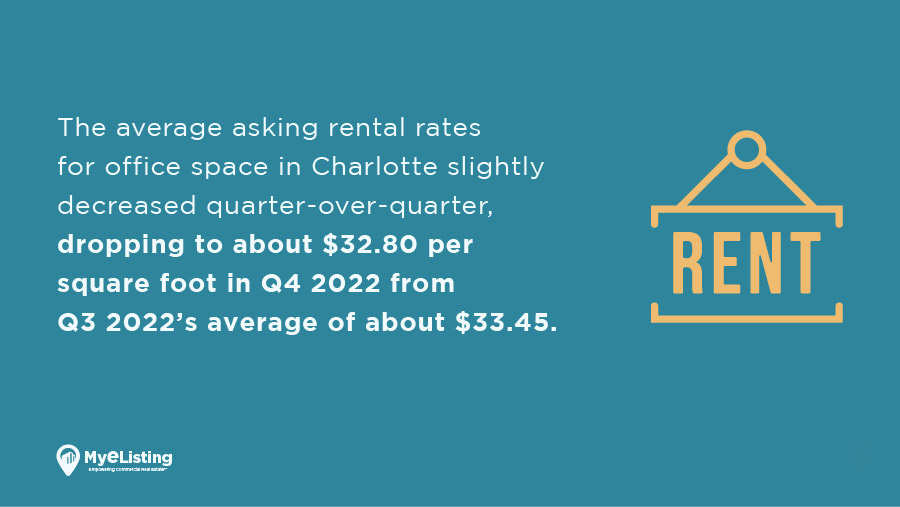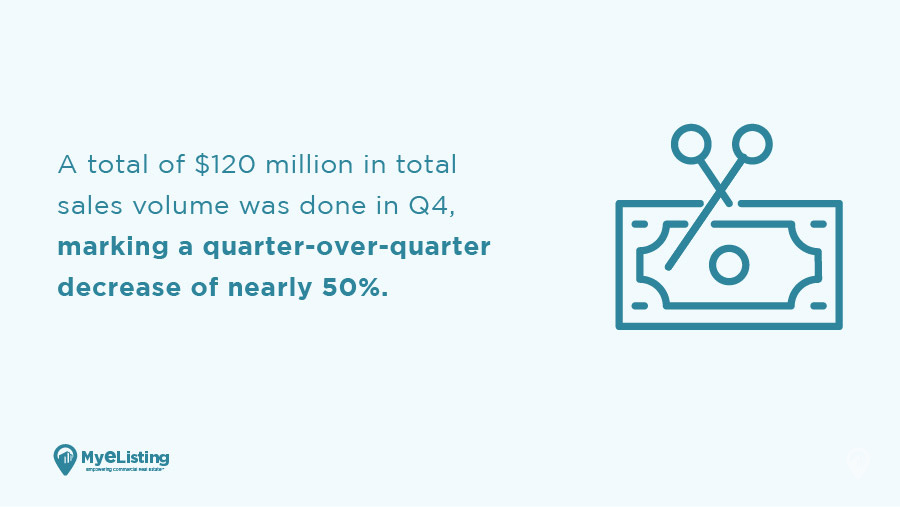Q4 2022 Office Space Report: Charlotte, NC

Specializes in providing actionable insights into the commercial real estate space for investors, brokers, lessors, and lessees. He covers quarterly market data reports, investment strategies, how-to guides, and top-down perspectives on market movements.

Charlotte’s office space market is home to several Fortune 500 companies like Bank of America, Lowe’s, and Nucor.
Unemployment held steady quarter-over-quarter at 3.1%, lower than the national average of 3.5%.
From 2016 to 2017, Charlotte’s metro area grew by 201,349 people, an 8.1% increase. This makes it one of the fastest-growing metros in the nation.
General Area Overview & Demographics
Charlotte, NC, is the 17th largest city in the United States, with an estimated population of 879,709. The racial makeup comprises 40.8% White, 37.9% Black or African American, 11.0% Hispanic or Latino, 5.1% Asian American, 2.6% two or more races, and 0.7% American Indian or Alaska Native.
Charlotte, NC Median Household Income & Population
The median household income is $52,925, slightly higher than the national median of $51,939. Additionally, it is estimated that 19.2% of households in the city make less than $25,000 per year, while 24% make between $50,000 and $75,000 annually.
According to the US Census Bureau, 28.5% of Charlotte’s population is between 18 and 34, while 25.9% are aged 35 to 54. Meanwhile, 19.2% of the city’s residents are between 55 and 64, and 19.5% are 65 and over.
The University of North Carolina at Charlotte, Johnson C. Smith University, Queens University of Charlotte, and the Charlotte School of Law all have campuses in the city. Central Piedmont Community College has numerous campuses in the greater Charlotte area.
Charlotte has a humid subtropical climate, with relatively mild winters and hot summers. July is typically the hottest, while January is the coldest. The city receives an average of 40 inches of rain annually, with a greater amount falling in late spring and early summer.
Summary of Charlotte Office Space Performance in Q4 2022
In the fourth quarter of 2022, the Charlotte office space market experienced a jump in the total vacancy rate to 20.4%, 3.8% higher than the figure of 16.6% at the end of 2021.
The Midtown/South End submarket maintained one of the lowest vacancy rates in the region during this period, decreasing year-over-year by 4.6% to 15.3%.
Vacancy increased from 18% to 28.3% year-over-year for Charlotte’s University submarket.
After net absorption declined by over 230,000 square feet in the fourth quarter, total positive absorption for 2022 ended at around 140,000 square feet.
What are office space rents like in Charlotte?

The average asking rental rates for office space in Charlotte slightly decreased quarter-over-quarter, dropping to about $32.80 per square foot in Q4 2022 from Q3 2022’s average of about $33.45. Despite this slight drop, Charlotte remains one of the most expensive cities in the country for commercial real estate.
Tenants are showing a preference for higher-tier spaces that are rich in amenities.
Rents were highest in the Midtown/South End submarket for Class A product, with prices reaching nearly $45 per square foot, an increase over Q3’s average.
Class A’s average rental rate in South Park was over $40 per square foot.
Across all submarkets, Class A units averaged around $35.30 per square foot.
Purchase & Leasing Activity

A total of $120 million in total sales volume was done in Q4, marking a quarter-over-quarter decrease of nearly 50%.
The average price per square foot was $200.40 for Charlotte office space.
2022 closed with $1.3 billion in total annual sales volume.
Regarding leasing activity, there was additionally a quarter-over-quarter decline of about 50%, with only 513,000 square feet being signed.
The annual total for leasing activity across renewals and new leases reached 3.6 million square feet.
Notable Office Space Deals in Charlotte in Q4 2022
There were several deals for Charlottes’s office space properties.
- Columbus McKinnon’s leasing of about 55,300 square feet.
- The Hartford Insurance’s leasing of about 55,000 square feet.
- Albemarle’s acquisition of 438,000 square feet of space.
- Griffin Partners’ acquisition of 64,100 square feet of space.
These are select examples among other activity.
New Office Space Development Activity in Charlotte in Q4 2022
Charlotte’s office space pipeline had over 2.5 million square feet under construction in Q4, with 272,000 square feet already preleased.
No new projects entered the pipeline in 2022’s last quarter.
Legacy Union Phase IV, a 410,000-square-foot building in the Uptown submarket, was the largest speculative project in development. It’s to come online in 2024.
Market Forecast for Charlotte’s Office Space Market
Employers have the upper hand in Charlotte’s labor market, prompting them to create return-to-work policies and plan for additional office space as more employees gear up to work from the office.
Anticipate economic headwinds in 2023, which may cause office investment sales and new construction to decelerate.
CBD/Uptown Charlotte remains a hot spot for subleasing, with favorable rental rates and shortened leasing terms luring occupiers to the vibrant center of North Carolina’s largest city.
Takeaways for Office Space Investors

Charlotte continues to boast strong office space fundamentals with a growing labor market and a return to in-office work.
As flight-to-quality proves to be the norm, investors should consider desirable submarkets with higher-tier product.
Stay diligent and happy investing.
Find & Connect With Commercial Real Estate Agents & Brokers in Charlotte, NC for Free on MyEListing.com!
MyEListing.com maintains one of the largest national databases of commercial real estate agents & brokers. Use it for free to find and agent or broker in Charlotte, NC.
Article Search
Share
All Article Categories








